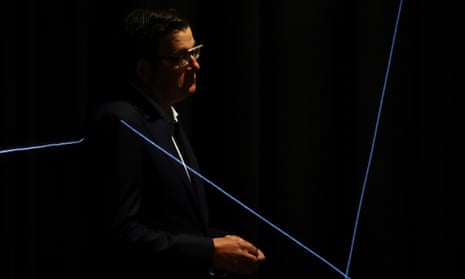The Andrews government will scrap preventative detention powers and tighten restrictions about who can be an authorised officer in a bid to pass a controversial bill seen as vital to Victoria’s response to a second wave of coronavirus cases.
The move has been cautiously welcomed by crossbench MPs, who had insisted on the amendments to win their support – the government needs the backing of at least three of 12 crossbenchers for the bill to pass.
Transport Matters party MP Rodney Barton confirmed to Guardian Australia that the Victorian government had agreed to the amendments in discussions with him and other crossbench MPs.
The omnibus bill will be introduced to the upper house next week.
Barton said he was pleased the government had listened during negotiations and made the amendments, but he was yet to make a decision regarding his support.
“I’m not sure it’s a win but it’s better,” he said. “I’m not 100% happy with it.”
The majority of the bill focuses on extensions to existing arrangements put in place to ensure institutions such as courts can function during the pandemic.
But controversial changes allowing the appointment of unspecified authorised officers with powers to detain people on a “reasonable belief” they will not comply with public health directions were seen as a gross overreach by several MPs, legal bodies, and civil liberties groups.
According to a table outlining the proposed amendments seen by Guardian Australia, police and protective services officers will still be able to be appointed as authorised officers, but with lesser powers than had previously been allowed.
The powers still include being able to search a property without a warrant if “necessary for the purpose of investigating, eliminating or reducing the risk to public health”.
The categories of people which are now specified as being able to be appointed as authorised officers include interstate public health workers, health professionals, WorkSafe inspectors and individuals with specific and relevant skills who are not already employed as Victorian public servants.
Animal Justice party MP Andy Meddick is still considering whether to support the bill, but is far more likely to back it given the amendments.
“I listened to the concerns of the legal community, other interested groups and my own constituents, and took some honest and constructive feedback to the government,” Meddick said in a statement. “I am pleased to see they have acted and amended the bill to suit community expectations.
“I want to work with the government – not against them – to introduce the appropriate measures to stop the spread of the coronavirus and allow society to open up again in a safe way. This is a great example of the constructive ways that the government and the crossbench can work together to get the best result.
“The restrictions are part of the government’s plan to defeat the health crisis first, and are working. The periods of lockdown and restricted movement have been doing the heavy lifting of minimising further infections of coronavirus.”
Reason Party MP Fiona Patten said the government had been backed into a corner after it was clear they did not have crossbench support.
“I don’t think they had much choice,” she said.
Patten is more inclined to vote in favour of the bill given the amendments, but may seek a commitment to make some of the measures relating to the justice system in the bill permanent, such as increased use of video conferences for court hearings and prison visits.
Greens upper house MP Samantha Ratnam tweeted that she welcomed the changes to the bill.
The Victorian Greens welcome the government's changes to the controversial parts of its Omnibus Bill. It has finally listened to our concerns and the community. Giving police and PSOs powers of detention for public health purposes was unnecessary and dangerous. #springst
— Samantha Ratnam - Leader of the Victorian Greens (@SamanthaRatnam) October 7, 2020
The Greens are believed to be leaning towards supporting the bill.
Crossbench MPs have been inundated with emails urging them to vote against the bill, or to request that it be subject to a Scrutiny of Acts and Regulations Committee hearing.
Barton said he had received hundreds of emails regarding the bill – five of them landed in his inbox during five minutes while he was speaking to Guardian Australia.
Many of the emails calling for a committee hearing share a template that has been circulated on social media, including on groups which have espoused 5G conspiracy theories and been promoting protests against Victoria’s lockdown.
“This bill in its current form represents a blatant disregard for the preservation of our human rights,” a template seen by Guardian Australia reads.
Legal and civil rights groups were also critical of the original draft, saying the bill appeared to lack oversight and represented an unreasonable increase in powers to police the pandemic.
